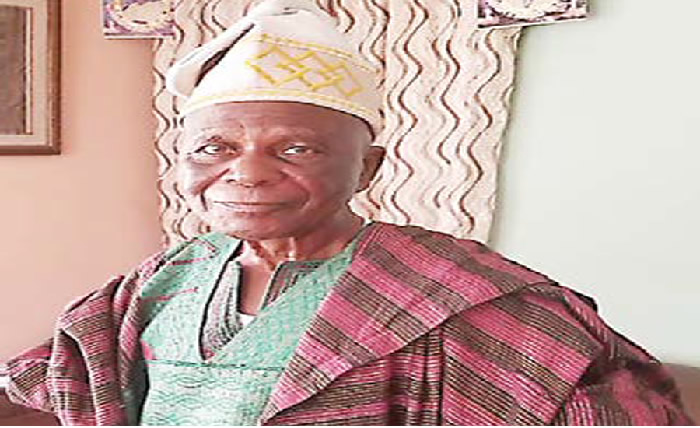
Retired school principal, Meshach Odeja, 91, tells EMMANUEL OJO about his 42 years in public service, family and related issues
You recently celebrated your 91st birthday. How do you feel living up to this age?
I have to thank God at this age. God has been guiding me. I don’t have any wisdom of my own. It’s only God that gives that wisdom. I miss having pupils around me. I like them. I like young people and whenever I see them, I feel very happy but I have retired (from active service). I retired in December 1989. My pupils organised a very interesting event to send me off, which I never expected. It lasted for two days.
They killed a cow and set up canopies, which I never expected. The Parent-Teacher Association rallied round me. When I asked them the reason they did all that, they said it was because I acted as a father to all the children. People from the Ministry of Education came and interrogated us about the source of the money for the. We were basically funded by the government at that time but the members of the PTA took up the responsibility and contributed money to organise the party. The event was so elaborate that the next principal was queried and asked to explain where he got the funds for the event because, at that time, teachers were not allowed to levy students.
I was the principal of Community Grammar School, Akowonjo. I served there for about 11 years. We underwent many difficulties. During the rainy season, it was always a sorry sight.
The teaching profession in Nigeria is one of the least admired due to poor remuneration. What makes you love it?
The teaching profession has undergone a lot of changes. In those days, it was the people that didn’t have a job that took to teaching but my case was different. It was a devotion for me. I had an interest in teaching. My father wanted me to be a pastor. He was an evangelist. He wanted me to go to St. Andrew’s College, Oyo, to become a pastor, but I told him that I didn’t want to be a pastor but a teacher. I couldn’t convince him and he was not happy. I told him that he taught me about Jesus Christ being a teacher and he (Jesus) taught many things, so, I wanted to be a teacher too so that I could teach young ones and bring them up. It was at that point that my father agreed.
Secondly, I was interested in the teachers of old. They wore shorts with long socks and very beautiful shoes imported from overseas. Those shoes were usually shiny after applying polish and made a sound as the wearer walked in them on the floor. We regarded the teachers then as next to God. That fascinated me. I also loved the way they dressed.
What are some of the changes you have observed?
When I was the principal of Community Grammar School, Akowonjo, I was the first to own a car but now, if you get to some schools today, you will see cars. Almost everyone has a car. Things have changed a lot. I was also the first graduate member of the Nigeria Union of Teachers on Lagos Island. Teachers of these days believe that they must receive their rewards here but in those days, we believed that our reward was in heaven. I worked very hard. I was not looking for money. I have never prayed to have money in my life. I didn’t even know the Ministry of Education because I didn’t leave my office to go and do anything there but these days, teachers easily go there to push for promotion.
My focus was on how to develop my pupils and help them become useful citizens in society and that was why when Community Grammar School, Akowonjo, was established, our motto was ‘Be a Good Ambassador’. All my pupils are my ambassadors. I told them they must be loyal to their parents, their community, their states, and the nation.
What schools did you attend?
I attended a primary school in Ilesha, Osun State. Later, I went to Oba, in Akoko, Ondo State, where I obtained Standard One to Three. I left Oba for St. Paul’s, Arigidi, Ondo State. The practice then was that before one gets to Standard Five, one had to take the common entrance examination. There were a few schools that had Standard Five and Six then. I attended Jubilee Standard School, Ikare, Ondo State, and that was where I obtained Standard Five and Six.
I had some teachers then that I cannot forget. I was also the timekeeper. I was a prefect for two years. To enable me to know what the time was at that time, I had to go to the town, which is about three kilometres or more from where we were, to check the time and correct our clock at the archdeacon’s place; he was a Jamaican.
Were there no clocks in the community at that time?
There was no clock. We usually listened to the British Broadcasting Corporation to know what the time was at that time.
How did you listen to the BBC?
We heard from the radio at the archdeacon’s place. No one had a radio at that time. So, we had to set the time from that radio and there was no electricity either. It was only Lagos that had electricity. From there (Jubilee Standard School), I attended Witty College, Ikare, Ondo State, and thereafter, I went for training as a pivotal teacher after which I returned to serve my sponsors. The teachers’ training programme was for two years. One could not afford to go be trained without being sponsored.
Who was the sponsor?
It was either the state government or the local government. I could not get anyone to sponsor me but later, I got the sponsorship of the Ijebu South Local Government Area. It offered to sponsor me for two years and I had to serve them for four years as a teacher. One had to fulfil one’s bond. I served in Ogun State, in Ijebu South and I became a principal there. That was where I met my wife.
What year was that?
That was 1958. I served them for four years. I didn’t break the bond and they were so happy. After serving in Ijebu, I came to Lagos. I served at St. Jude’s School because it was short of teachers. Despite having attained the level of a principal in Ijebu South, I went to Lagos to serve as a class teacher but I didn’t bother. It was while I was there that I studied for my advanced levels exams and I passed and was offered admission to the University of Nigeria, Nsukka, to study Education. When I got there, I was under the tutelage of Prof (Babatunde) Fafunwa of Lagos. He was a great educationist but I was a very poor student. I suffered at the university because I had no money and my parents were very poor.
How were you able to fund your university education?
As one of the indigent students, the students’ affairs (department) saw my plight and was ready to help me because I couldn’t pay my school fees. In those days, one could go to the department to obtain a loan. I applied and I was given a loan. My condition was very critical then. I wrote another undertaking that immediately after I graduated, I would get a job and pay back the loan. As a result of that, they withheld my certificate till I paid. After graduation, instead of sitting at home and looking for a job, I went around all the secondary schools in Lagos looking for a placement. When I was able to raise the money and offset the loan, the university posted my certificate to me and I was very happy. It was in the 1960s.
How long did you serve as a teacher?
I served for 42 years as a teacher before retiring in 1989, inclusive of the probationary years. I served for 35 years as required by law. I served the Federal Government for 21 years and Lagos State for 14 years within that period.
What subjects did you teach?
I taught History and Geography. I came from Ikoyi to Yaba to teach my pupils in advanced-level classes and after the classes, I went back to Ebute-metta where I lived.
Were you a disciplinarian as a teacher?
Yes. I am a disciplinarian. I am very tough.
How did you correct your pupils when they did wrong?
At school, there were senior and junior pupils. The big boys always liked to bully the younger ones. The cultism thing didn’t start recently; we experienced it. I was able to see what the future would be like. I kicked against it. I expelled about six of my pupils because of bullying and cultism-related offences. Pupils started practising cultism in secondary school, not even in the university. Sometimes, at lunchtime, the big boys took the lunch money of the younger ones and made them go hungry. When the report came to me, I expelled them but the Ministry said that I couldn’t drive them away. I insisted anyway because they would end up becoming a bad influence on the others. Even with the parents, we fought over it for six months.
After their expulsion, I called the expelled pupils and told them it was not the end of the world. I told them not to give up, and that they could do better. I talked to them, advised them and some of them that were expelled are engineers and lawyers today.
How will you compare education in the colonial era to what we have now?
Things have really changed. The style of teaching has changed, just like many other things. There are lots of changes in the system. I was a West African Examination Council examiner for many years, starting from 1969 till 1989 when I retired. In those days, when examinations were conducted, there were lots of malpractices but now, it’s not so again. Everything is in electronic form now. Things have changed and technology has made so many things easier.
In those days, schools were owned by missionaries and people taught their children godliness. Nowadays, people go to school just to learn. That aspect (godliness) is left out; that moral aspect is never touched.
You said exam malpractices existed when you were a teacher. Were there also obvious corrupt practices in government?
There was corruption then but there was not much money as there is now, so, corruption was not so obvious. There has always been corruption but it wasn’t pronounced then as it is now. Computers are supposed to enhance or make life better but instead of that, people have learnt to use them negatively for perpetrating fraud and other crimes.
Since your retirement in 1989, some 33 years ago, how have you kept yourself busy?
Well, they (the government) told me to go and rest and I am resting (laughs). They told me to go and rest and I must obey that. I’ve gained weight since then but I don’t feel happy because I don’t see children around me anymore the way I used to see them, talk to them, shout at them, and so on. That’s another challenge for me. I also can’t go wherever I like; I can’t walk as smartly as I used to anymore. Because of that experience, I set up a school here just to be able to carry on with what I left because my wife was also an educationist. She was a principal before she retired and died. So, we wanted to have a school where we could move shoulder to shoulder with young ones.
I spent all the money I had to buy benches and all that. Some of the parents of my old pupils came with some children, saying that since I had a school of my own, they should also enjoy the benefits. They brought their children but they didn’t have money to pay. It’s expected of me to get teachers for the school and as an educationist, I can’t employ someone who is not a graduate, for instance, to teach secondary school pupils. It’s cheating to employ a school certificate holder to teach at a secondary school. Those parents knew that if they didn’t pay, I wouldn’t drive their wards away from school. As a result, they ran us down and that’s why I forgot about the school.
How do you feel when you see the pupils you taught doing very well as adults?
Each time I hear that someone I taught is now a professor, doctor and so on, I feel very proud. Many of them I taught have become professors and they still come to greet me. When some of them see me now, they mimic my mannerism just to make fun. I told them those days that they had to work hard if they didn’t want to end up as paupers. I told them that if they worked hard their shoes would make clicking sounds on the floor when they walk. I told them that if they didn’t work hard when they saw me in the future, they would sneak and run away. We all joke about those sayings now.
You said earlier that you met your wife in 1958 while working to repay your study loan. How exactly did you meet her?
I met my wife at Idowa, in Ijebu-South when I was having the bond programme. She also was observing the bond too. She was a junior teacher and was very hard-working. Each time she saw me depressed, she would ask what the challenge was. At the time, I told her that I didn’t have money to sponsor my brother who was in London. At one point, she went home and brought some money and gave it to me. After the programme, I left her and came to Lagos and as fate would have it, we met in Lagos again. My friend tried talking me into proposing to her but I couldn’t because the friendship was so deep and I couldn’t tell her that. My cousins discovered that she was a good girl and they wrote a letter to her parents in Jos on my behalf that they wanted to marry her for me.
What else did you like about her?
She was very good with languages. She studied English and French and that was what she taught in school. We then started dating and I told her that I must go to the university before we could be married because I was just a trained pivotal teacher then. At the time we got married, I was not rich. She footed the whole bill. She had wealthy relations at Isale-Eko. I couldn’t even buy a (wedding) ring then. I went back to the university after we got married. It was at the time I was about to graduate that we had our first child.
How many children do you have?
Hmm, I have many children. Laughs
I was referring to your biological children.
Okay. I have just four biological children. One is deceased. She died in a car crash two years ago.
Looking back over the years, is there something you can refer to as regret in your life?
I was not happy when my pension was stopped 10 years ago. They (the government) stopped paying my pension and that was something I had been receiving for about 15 years before. They (government officials) said my name was no longer on their voucher. I sat and thought of it, that I served this nation. I was not happy but my wife and I started managing hers. I was content with what we had. After about five years, they stopped my wife’s pension too. They kept calling us from Abuja to confirm our names, numbers, and general identities but apparently, those were the people siphoning the money.
Later, when the Buhari government came, it conducted a verification exercise and discovered that we were out of its payroll, so we were reinstated and the payment of our pensions resumed. The pension is less than N20,000. It’s not even up to a minimum wage but I’m happy with the little I’m given. I’m satisfied with it. I was not promoted but my wife was promoted three times and it helped us.





